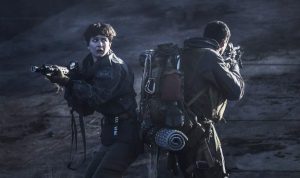Alien: Covenant
Directed by Ridley Scott
Starring Michael Fassbender, Katherine Waterston, Billy Crudup, Demian Bichir, Danny McBride
[rasting: 3/5]
Reviewed by Michael Dalton
There will be two audiences for Ridley Scott’s Alien: Covenant, the latest instalment of the Alien franchise. Those eager to see the universe that Scott established back in 1979 expanded and explored, and those who can’t wait to see (and hear) one of cinema’s most terrifying monsters back doing what they do best. Blend them together because you get both but, without unleashing any spoilers, there’s another villain to meet, one that might just take your breath away.
Set in 2104 (eighteen years before the first chapter), the ship Covenant is travelling to the remote planet Origae-6. Carrying a dozen crew, two thousand colonists, and a thousand embryos, the ship is disturbed by an energy surge that kills the captain and soon a radio transmission (Take Me Home, Country Roads, crooned by John Denver) from a planet in their orbit. You can look forward to the tying up of loose ends left dangling in the previous adventure Prometheus, the return of the synthetic David (Michael Fassbender) who has much to say and do (especially after he meets up with his successor Walter (Fassbender again), stomach and back bursting scenes designed to revolt and stagger, and a few masterfully executed scenes of sheer galactic terror. Indeed the monsters themselves, hostile and fast, remain the prize of the franchise and Scott executes these scenes with gusto and if any director can be excused for sentimentality (let that read derivative) in this universe, it is Scott. The floaty, teasing score by Jed Kurzel echoes Jerry Goldsmith’s dreamy work in the original, the lure to the dangerous planet is created in the same way, and the final battle looks awfully familiar, but there is more. Once upon a time infection and creation were created by the notorious face-huggers (fear not they make a horrid return) but there are microscopic spores to contend with here, nearly invisible particles that, in an eerie sequence, move balletically before penetration to create a deadly cousin.
Scott said when casting for the 1979 adventure, he needed actors who could establish their characters with economy so he could focus on the technical aspects of the film. We needed to know them to care about their fate and Sigourney Weaver, Veronica Cartwright, John Hurt, and Yaphet Kotto were all sensational, delivering fully realised characters. Disappointingly, the crew of Covenant don’t make any impression (Katherine Waterston is a poor substitute for Ripley), and even more disappointing is Scott’s curious reluctance to maintain the tension. The set pieces are astounding and some way into the action there’s a brilliantly choreographed sequence where all hell breaks loose (the blood-shy will be eyeing the exit signs) but the tempo wavers annoyingly with extended sequences of exposition. The thrill here, aside from the violent, too-close encounters, is watching the film-stealing Fassbender in dual roles that venture into strange territory. It’s a sensual pleasure watching the two synthetics study each other and soon realise how different they are. Who would have expected melodrama? Or a music lesson? Or intimacy?
Cinematically, Covenant is stunning and the design begs for the biggest screen you can find. There isn’t a scene where we forget we’re in the hands of one of the medium’s great artists. The journey through the cavernous mausoleum before which lays a thousand charred corpses is one to behold and a nocturnal battle amidst flares and scampering little aliens had the audience jumping along with their prey. In these dazzling moments we remember why we’ve come back for more.




